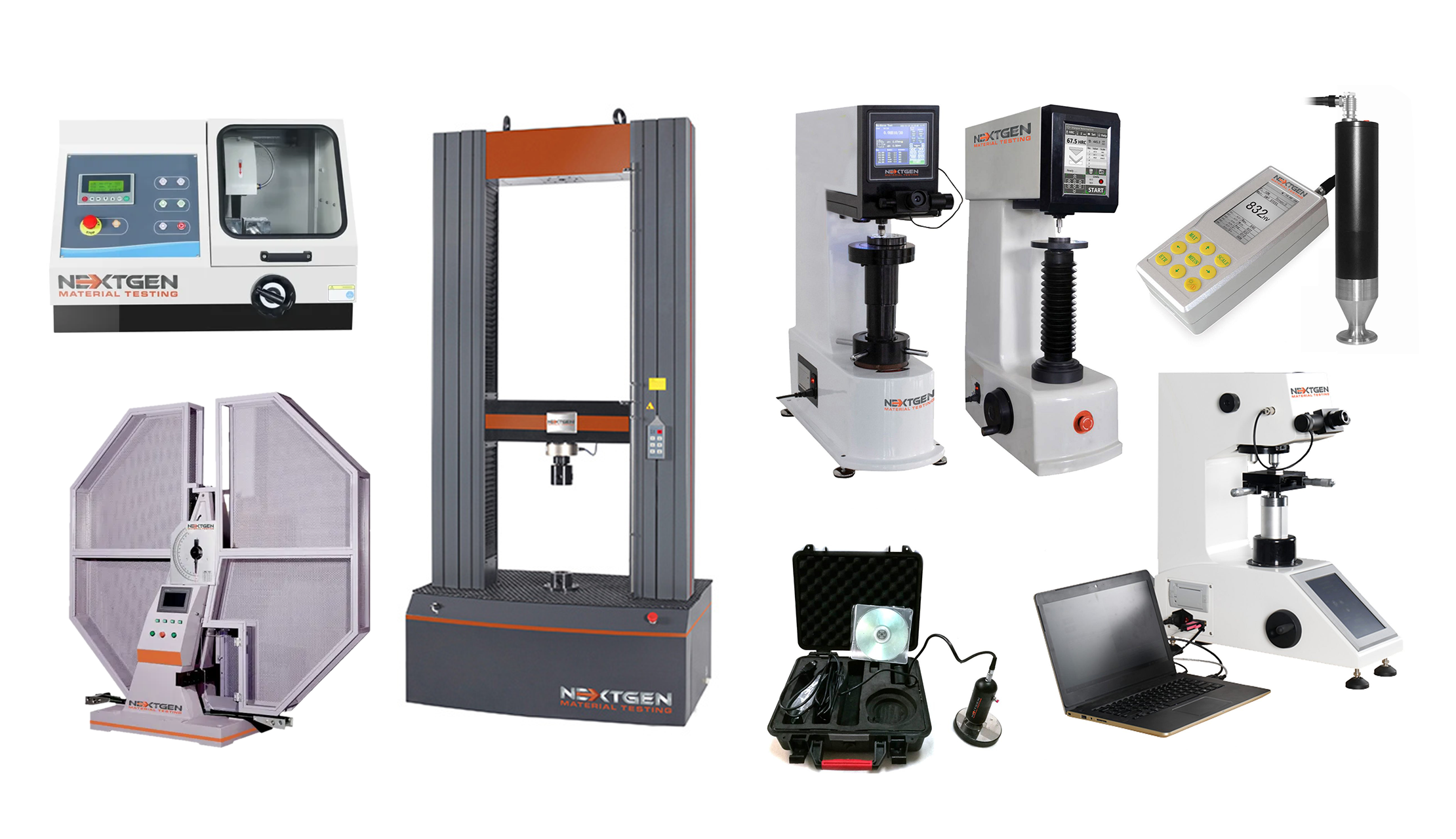To sum upThe field of material testing includes an extensive number of procedures used to evaluate the properties and performance of materials. These procedures range from assessing mechanical characteristics such as tensile strength, hardness, and impact resistance to evaluating thermal properties like conductivity and expansion. Central to these evaluations are material testing tools, which provide the precise measurements necessary to verify that materials are reliable and safe to use.
The selection of testing equipment is comprehensive, reflecting the diversity of materials—including metals, polymers, ceramics, and composites—and the specific tests required for each. For instance, metals may undergo tensile, hardness, and fatigue tests, each requiring specialized machinery. Similarly, polymers might be subjected to impact and thermal analysis, again requiring distinct equipment. This specialization results in a multitude of purpose-built machines adapted to specific testing protocols.
With such a wide selection of equipment available, you might wonder: what are the most commonly used types of material testing tools? Throughout this article, we will answer that question by exploring the top 10 categories of these useful tools. You will discover their key applications, learn when and where they are most effectively used, and uncover other intriguing details that highlight their importance in material science.
What is Material Testing Equipment?
Material testing equipment, also known as material testing tools or materials testing machines, refers to a broad array of instruments that are used to evaluate materials’ physical and mechanical properties. These tools assess attributes such as strength, durability, hardness, and elasticity, making sure that materials meet specified standards and are suitable for their intended applications.
Material testing equipment can handle extensive tasks, covering evaluations from tensile strength and compressive resistance to impact toughness and thermal stability. Industries such as construction, aerospace, automotive, manufacturing, and materials science laboratories use these tools to verify material performance, maintain quality control, and support research and development efforts.
Examples of material testing equipment include universal testing machines, hardness testers, impact testers, fatigue testing machines, and non-destructive testing instruments like ultrasonic flaw detectors and X-ray machines. Each type serves a specific function, collectively guaranteeing that materials perform reliably and safely in their respective applications.
Top Categories of Material Testing Tools
Although each type of material testing equipment has an important role to play in its specific testing procedures, all categories can be organized into a list of the most commonly used. Now let us explore which types of material testing tools are the most popular and widely relied upon in the list below:
1. Universal Testing Machines (UTMs)
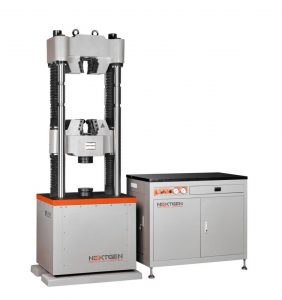 Universal Testing Machines, often abbreviated as UTMs, are among the most versatile and valuable tools in material testing. These machines are capable of performing a large number of tests, including tensile, compression, bending, shear, and flexural tests, making them the backbone of material testing laboratories.
Universal Testing Machines, often abbreviated as UTMs, are among the most versatile and valuable tools in material testing. These machines are capable of performing a large number of tests, including tensile, compression, bending, shear, and flexural tests, making them the backbone of material testing laboratories.
A UTM evaluates materials’ mechanical properties by applying controlled forces to test their strength, elasticity, and deformation under different stress conditions. It can measure tensile strength, yield point, ultimate strength, and elongation in tensile tests, as well as compressive strength and modulus of elasticity in compression tests.
A UTM consists of a load frame, a crosshead, and interchangeable fixtures or grips that hold the material specimen. The machine applies a precise force or load to the specimen, either pulling (tensile) or pushing (compressive), while sensors and extensometers measure deformation and force. These results are displayed in real time, providing data for material analysis.
2. Hardness Testers
Hardness testers are specialized devices designed to measure material resistance to indentation, scratching, or penetration. This category includes testing methods such as Rockwell, Vickers, and Brinell, each serving specific material and application requirements.
Hardness testing evaluates durability and wear resistance. The test is crucial for metals, plastics, ceramics, and composites, providing insights into their ability to withstand mechanical wear or surface deformation.
The testing method varies depending on the type of test:
-
Rockwell Test: Measures hardness by applying a fixed load with a steel or diamond indenter and recording the penetration depth.
-
Vickers Test: Uses a diamond-shaped indenter with precise force to measure indentation surface area.
-
Brinell Test: Involves pressing a hard steel or carbide ball against the material and measuring the diameter of the resulting indentation.
3. Impact Testing Machines
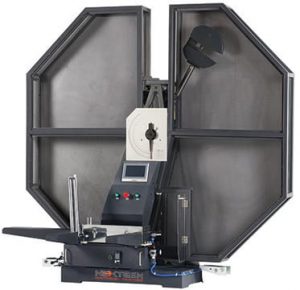 Impact Testing Machines measure a material’s toughness and its ability to absorb energy during a sudden impact. These machines are extremely important for evaluating materials’ brittleness and fracture resistance under high-stress conditions. Common types include Charpy and Izod impact testers.
Impact Testing Machines measure a material’s toughness and its ability to absorb energy during a sudden impact. These machines are extremely important for evaluating materials’ brittleness and fracture resistance under high-stress conditions. Common types include Charpy and Izod impact testers.
-
Charpy Test: In this method, a notched specimen is placed horizontally, and a pendulum strikes it on the opposite side of the notch.
-
Izod Test: This test involves positioning a notched specimen vertically, with one end clamped in place. The pendulum strikes the free end, and the energy absorbed during the break is recorded.
Impact tests simulate real-world conditions where materials are subjected to sudden forces, such as collisions or falls. The machine works by swinging a pendulum or hammer at a controlled velocity to strike a notched specimen. The amount of energy absorbed by the material during fracture is recorded, providing data on its impact strength and overall durability.
4. Non-Destructive Testing (NDT) Equipment
Non-Destructive Testing (NDT) Equipment refers to a broad category of tools used to inspect materials’ internal and surface integrity without causing any damage. These methods are necessary for identifying defects, verifying safety, and maintaining material performance in critical applications.
NDT equipment includes ultrasonic testers, radiographic machines (X-ray), magnetic particle testers, and eddy current detectors. By way of example, ultrasonic testing uses high-frequency sound waves to detect internal flaws, while radiographic testing uses X-rays to create detailed images of a material’s internal structure. Magnetic particle testing identifies surface cracks in ferromagnetic materials, and eddy current testing detects surface and subsurface defects in conductive materials.
5. Compression Testing Machines
Compression Testing Machines are able to measure materials’ ability to withstand compressive forces. These machines are critical for evaluating materials that experience pushing or crushing loads, such as concrete, metals, and composites. They are commonly used to assess compressive strength, deformation, and elasticity under pressure.
These machines work by applying a controlled compressive load to a specimen until it deforms or fails. The specimen is placed between two platens, with one platen remaining stationary while the other applies force. The resulting data, including maximum load and stress-strain behavior, determines the material’s structural integrity and suitability for load-bearing applications.
6. Flexural Testing Machines
Flexural Testing Machines evaluate a material’s ability to resist deformation under bending forces. They are particularly useful for testing materials like concrete, wood, and composites, where flexural strength and stiffness are critical performance indicators.
The machine works by placing the specimen on two supports and applying a load in the center or at two points (depending on the test configuration). This setup creates a bending force that stresses the material until it fractures or deforms. The test provides insights into the material’s rupture modulus, flexural strength, and elasticity.
7. Fatigue Testing Machines
Fatigue Testing Machines are special devices used to assess how materials behave under repeated and cyclic loading. These machines are fundamental for evaluating the durability and lifespan of materials subjected to continuous or fluctuating stress, such as those used in dynamic or load-bearing applications.
The machine works by subjecting a material specimen to repeated stress cycles, alternating between tension, compression, or bending. Over time, repeated loading can cause micro-cracks or fail entirely. The machine records data such as the number of cycles endured before failure, providing insights into the material’s fatigue limits and durability properties.
8. Environmental Chambers
Environmental Chambers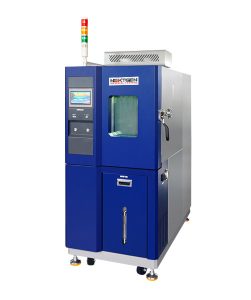 simulate specific environmental conditions, such as temperature, humidity, or pressure, to test how materials perform under an assortment of real-world conditions. These chambers are frequently used to evaluate material stability, durability, and performance when exposed to extreme or fluctuating conditions.
simulate specific environmental conditions, such as temperature, humidity, or pressure, to test how materials perform under an assortment of real-world conditions. These chambers are frequently used to evaluate material stability, durability, and performance when exposed to extreme or fluctuating conditions.
The chamber creates controlled conditions by regulating factors like temperature (ranging from extreme cold to high heat) and humidity (from dry to saturated environments). Specimens are placed inside and subjected to these conditions for a specific duration, while the chamber monitors and records changes in the material’s physical or mechanical properties.
9. Moisture Analyzers
Moisture Analyzers are used to measure moisture content in materials, verifying that they meet required specifications and quality standards. These tools are extremely useful in applications where moisture levels can significantly impact material performance, such as construction, food production, or soil analysis.
The device works by heating the material sample and measuring weight loss as moisture evaporates. Advanced moisture analyzers use precise weighing systems and temperature control to provide highly accurate readings. These results provide a better understanding of how moisture content affects material behavior, stability, and usability.
10. Tensile Testing Machines
Tensile Testing Machines are dedicated instruments used to measure materials’ tensile strength. These machines apply a pulling force to a specimen until it breaks, evaluating properties such as ultimate tensile strength, elongation, and modulus of elasticity.
The specimen is clamped securely between two grips, and a steadily increasing tensile load is applied. The machine records data on how the material stretches, deforms, and ultimately fractures. This information is crucial for understanding a material’s ductility, toughness, and capacity to withstand tensile forces.
Tensile testing machines are ideal for laboratories that focus specifically on tensile evaluations, offering precise measurements to determine material suitability for applications requiring resistance to pulling forces.
Looking for Reliable Material Testing Equipment?
At NextGen, we have many years of experience providing material testing establishments with top-notch equipment.
NG-EML Single Column Bench Top Universal Testing Machine (50N-5kN)
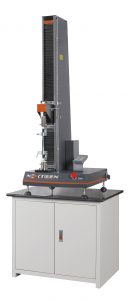 The NG-EML Single Column Bench Top Universal Testing Machine is a compact and powerful tool ideal for standardized and routine material testing applications. With a load range of 50N to 5kN, this machine is designed to perform tension, compression, and flexure tests, providing an excellent choice for laboratories with limited space. Its electromechanical drive system provides high-speed, low-vibration operation, delivering precise and consistent testing results.
The NG-EML Single Column Bench Top Universal Testing Machine is a compact and powerful tool ideal for standardized and routine material testing applications. With a load range of 50N to 5kN, this machine is designed to perform tension, compression, and flexure tests, providing an excellent choice for laboratories with limited space. Its electromechanical drive system provides high-speed, low-vibration operation, delivering precise and consistent testing results.
Equipped with pre-loaded ball screws and linear motion guides, the NG-EML provides superior alignment and accuracy. Its advanced software includes a library of pre-programmed industry standards such as ASTM, ISO, DIN, and EN, simplifying compliance testing. The machine also features safety mechanisms like automatic limit checks for overload, temperature, and crosshead positioning.
This universal testing machine is particularly suited to testing small and delicate specimens, including plastics, fine wires, fibers, threads, biomaterials, thin films, adhesives, foam, packaging, paper products, and consumer goods. Its customizable options, including grips, fixtures, and extensometers, allow it to be adapted to different types of quality control and production testing needs.
Class D Single Column Charpy Impact Tester (150J-750J)
The Class D Single Column Charpy Impact Tester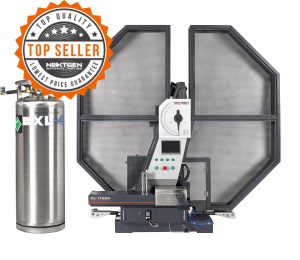 is a high-capacity impact testing system built specifically for Charpy impact tests in compliance with ASTM E23, ISO 148, and EN10045 standards. It is built to evaluate the toughness and impact resistance of materials under high-energy conditions, with models offering peak capacities of 450J or 750J and optional pendulums for 150J, 300J, 450J, and 600J.
is a high-capacity impact testing system built specifically for Charpy impact tests in compliance with ASTM E23, ISO 148, and EN10045 standards. It is built to evaluate the toughness and impact resistance of materials under high-energy conditions, with models offering peak capacities of 450J or 750J and optional pendulums for 150J, 300J, 450J, and 600J.
This impact tester features a robust single-column design with a heavy cast-iron base to minimize vibrations that could affect test results. Its motor-driven pendulum system includes an electromagnet for secure locking and precise raising, assuring repeatability and accuracy. The pendulum’s design minimizes wind resistance, and its high-precision bearing system allows reliable testing under stringent conditions.
The Class D Tester is equipped with both analog and digital readouts, with optional connectivity to a PC for advanced data analysis through specialized software. Additional features include a touchscreen display, customizable striking knives for different standards, and optional add-ons like a specimen feeding system for fully automatic operation or a nitrogen cooling chamber for cold testing down to -180°C.
The Key to Advanced Material Testing
The world of material testing is extremely broad, involving a variety of tools and techniques to verify the quality, durability, and reliability of materials used across many industries. From Universal Testing Machines and Hardness Testers to Environmental Chambers and Fatigue Testing Machines, each piece of equipment has a critical role to play in determining specific material properties. Understanding the top categories of testing tools provides a solid foundation for selecting the right equipment for your laboratory or production line.
If you want to upgrade your lab with reliable material testing tools, you’ve come to the right place. We offer a broad selection of equipment suited to meeting diverse testing requirements. Feel free to explore our website for more details. Moreover, if you have additional questions or want personalized assistance, you can contact us directly or request an online quote. We are here to help you make the most appropriate choice for your material testing needs!
